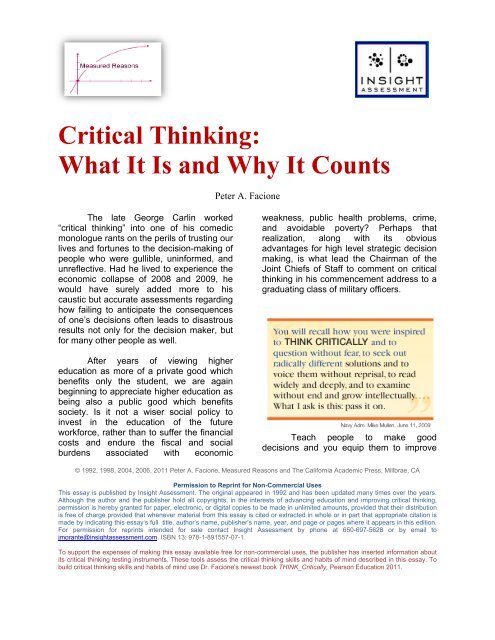Interpreting The Facts
Interpreting The Facts
Interpreting The Facts
Create successful ePaper yourself
Turn your PDF publications into a flip-book with our unique Google optimized e-Paper software.
Critical Thinking:<br />
What It Is and Why It Counts<br />
Peter A. Facione<br />
<strong>The</strong> late George Carlin worked<br />
“critical thinking” into one of his comedic<br />
monologue rants on the perils of trusting our<br />
lives and fortunes to the decision-making of<br />
people who were gullible, uninformed, and<br />
unreflective. Had he lived to experience the<br />
economic collapse of 2008 and 2009, he<br />
would have surely added more to his<br />
caustic but accurate assessments regarding<br />
how failing to anticipate the consequences<br />
of one’s decisions often leads to disastrous<br />
results not only for the decision maker, but<br />
for many other people as well.<br />
After years of viewing higher<br />
education as more of a private good which<br />
benefits only the student, we are again<br />
beginning to appreciate higher education as<br />
being also a public good which benefits<br />
society. Is it not a wiser social policy to<br />
invest in the education of the future<br />
workforce, rather than to suffer the financial<br />
costs and endure the fiscal and social<br />
burdens associated with economic<br />
weakness, public health problems, crime,<br />
and avoidable poverty? Perhaps that<br />
realization, along with its obvious<br />
advantages for high level strategic decision<br />
making, is what lead the Chairman of the<br />
Joint Chiefs of Staff to comment on critical<br />
thinking in his commencement address to a<br />
graduating class of military officers.<br />
Teach people to make good<br />
decisions and you equip them to improve<br />
© 1992, 1998, 2004, 2006, 2011 Peter A. Facione, Measured Reasons and <strong>The</strong> California Academic Press, Millbrae, CA<br />
Permission to Reprint for Non-Commercial Uses<br />
This essay is published by Insight Assessment. <strong>The</strong> original appeared in 1992 and has been updated many times over the years.<br />
Although the author and the publisher hold all copyrights, in the interests of advancing education and improving critical thinking,<br />
permission is hereby granted for paper, electronic, or digital copies to be made in unlimited amounts, provided that their distribution<br />
is free of charge provided that whenever material from this essay is cited or extracted in whole or in part that appropriate citation is<br />
made by indicating this essay’s full title, author’s name, publisher’s name, year, and page or pages where it appears in this edition.<br />
For permission for reprints intended for sale contact Insight Assessment by phone at 650-697-5628 or by email to<br />
jmorante@insightassessment.com. ISBN 13: 978-1-891557-07-1.<br />
To support the expenses of making this essay available free for non-commercial uses, the publisher has inserted information about<br />
its critical thinking testing instruments. <strong>The</strong>se tools assess the critical thinking skills and habits of mind described in this essay. To<br />
build critical thinking skills and habits of mind use Dr. Facione’s newest book THINK_Critically, Pearson Education 2011.

















